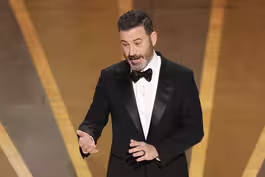
Health experts respond to Trump's claims on autism, vaccines
Clip: 9/22/2025 | 10m 34sVideo has Closed Captions
Health experts respond to Trump's claims linking autism to acetaminophen
President Trump tied the use of acetaminophen during pregnancy to autism and made several other claims about vaccines. William Brangham discussed those claims and the concerns about what the president said with Alycia Halladay of the Autism Science Foundation and Jennifer Nuzzo of Brown University’s School of Public Health.
Problems playing video? | Closed Captioning Feedback
Problems playing video? | Closed Captioning Feedback
Major corporate funding for the PBS News Hour is provided by BDO, BNSF, Consumer Cellular, American Cruise Lines, and Raymond James. Funding for the PBS NewsHour Weekend is provided by...

Health experts respond to Trump's claims on autism, vaccines
Clip: 9/22/2025 | 10m 34sVideo has Closed Captions
President Trump tied the use of acetaminophen during pregnancy to autism and made several other claims about vaccines. William Brangham discussed those claims and the concerns about what the president said with Alycia Halladay of the Autism Science Foundation and Jennifer Nuzzo of Brown University’s School of Public Health.
Problems playing video? | Closed Captioning Feedback
How to Watch PBS News Hour
PBS News Hour is available to stream on pbs.org and the free PBS App, available on iPhone, Apple TV, Android TV, Android smartphones, Amazon Fire TV, Amazon Fire Tablet, Roku, Samsung Smart TV, and Vizio.
Providing Support for PBS.org
Learn Moreabout PBS online sponsorshipGEOFF BENNETT: Welcome to the "News Hour."
President Trump today tied the use of the drug acetaminophen during pregnancy to autism and made several other claims about vaccines this evening without strong scientific evidence.
The president said the FDA will start advising women that acetaminophen, which is used in Tylenol, can be associated with autism.
During an event at the White House, the president said that that was his opinion and said most pregnant women should cope without it.
DONALD TRUMP, President of the United States: taking Tylenol is not good.
All right, I will say it.
It's not good.
For this reason, they are strongly recommending that women limit Tylenol used during pregnancy unless medically necessary.
That's, for instance, in cases of extremely high fever that you feel you can't tough it out.
You can't do it.
I guess there's that.
It's a small number of cases I think.
But if you can't tough it out, if you can't do it, that's what you're going to have to do.
You will take a Tylenol, but it'll be very sparingly.
GEOFF BENNETT: In addition to those comments, the president and his health team also suggested a cancer drug called leucovorin as a potential treatment for autism.
The FDA says it will now make leucovorin tablets available for some autistic patients with a specific neurological condition.
ROBERT F. KENNEDY JR., U.S.
Health and Human Services Secretary: We have also identified an exciting therapy that may benefit large numbers of children who suffer from autism.
Peer-reviewed literature has documented that up to 60 percent of folate-deficient children with ASD can have improved verbal communications if given leucovorin.
I have instructed NIH, FDA and CMS doctors to treat children appropriately.
GEOFF BENNETT: William Brangham has more on these claims and concerns about what the president and his team have said -- William.
WILLIAM BRANGHAM: For more on these questions and what we know about autism, I am joined by Alycia Halladay -- she's the chief science officer at the Autism Science Foundation -- and also by Jennifer Nuzzo.
She's an epidemiologist at Brown University's School of Public Health.
Thank you both so much for being here.
Alycia Halladay, to you first.
I just would love to get your initial response to this with regards to Tylenol.
The president made it quite clear that he believes the evidence is crystal clear that taking Tylenol when you're pregnant causes autism in the unborn child.
What does the evidence tell us about that?
DR.
ALYCIA HALLADAY, Chief Science Officer, Autism Science Foundation: Thank you for asking that question.
The evidence does not say that.
The scientific studies that have been conducted so far do not support the idea that Tylenol causes autism.
In fact, there were two very, very large studies that were conducted that use what is known as a sibling control, which controls or eliminates any sort of or most of the variability because of genetic background, and they did not see an association.
So his warnings for women to tough it out to prevent autism in their unborn children are completely unwarranted.
WILLIAM BRANGHAM: Listening to what he cited and what Kennedy and Marty Makary of the FDA said, did you get any sense as to what evidence they're looking at that seems to convince them that this is the case?
DR.
ALYCIA HALLADAY: They did mention in the press conference a study called the Boston -- a study out of Johns Hopkins that involved children in Boston.
That study was very small, and it actually didn't even measure acetaminophen exposure during pregnancy.
It only looked at acetaminophen exposure at the time of the birth.
So I'm not entirely swayed by that being the source of evidence for which they're claiming that vaccines cause autism -- I'm sorry -- acetaminophen causes autism.
WILLIAM BRANGHAM: Jennifer Nuzzo, we know that acetaminophen is prescribed for pain, but it's also prescribed to bring down fevers.
What do we know about the risk of not knocking a fever down when you're pregnant?
DR.
JENNIFER NUZZO, Brown University School of Public Health: Well, I mean, I think pediatricians generally -- sorry - - when you're talking about when pregnant, yes, I mean, certainly, fever can be detrimental.
And just simply telling women to avoid it is just not the kind of nuanced, evidence-based advice that pregnant women deserve.
I'm really reminded of comments that Secretary Kennedy made at a hearing in May when he said, I don't think people should be taking medical advice from me.
And based on what we heard today, I would very much reiterate that statement.
Nothing that I heard should be interpreted as medical advice.
And, certainly, pregnant women should be talking to their providers about how to manage fever.
But leaving it untreated might be detrimental.
And just blanket statements about don't use it is just really not based on evidence and also not the kind of nuanced, expert advice that pregnant women deserve.
WILLIAM BRANGHAM: But yet it is very hard to overlook the fact that this is the president of the United States and all of his senior health officials coming out and basically endorsing the idea that one of the most commonly used medications in the country, in the world, I believe, is potentially complicit in autism.
I mean, as a someone who really focuses on communication in public health, what is your response to seeing that tableau today?
DR.
JENNIFER NUZZO: Yes, I mean, this was really irresponsible today.
I mean, first of all, pregnancy, autism, these are all very serious medical issues that require evidence.
And nothing that's been done by this administration has been done to kind of produce the sort of evidence that would be required to answer these questions, to establish these links.
We saw an earlier report that came out of HHS in which it was clear that some A.I.
tool was used to kind of falsely summarize the evidence.
And I really fear that that's the level of care and concern that's gone into these conclusions.
There have been larger, more rigorous studies done looking at the relationship between Tylenol exposure during pregnancy and autism.
And that study basically said, no, that was not something that there was a strong link between.
And so it's just really strange and disheartening that we might be sort of cherry-picking really low-quality evidence and not just looking at it further and doing additional studies to look at it further, but holding a national presidential press conference.
I mean, that is so beyond what people deserve.
And it's just -- it's really quite stunning.
WILLIAM BRANGHAM: Alycia Halladay, back to you on this issue of vaccines.
We saw the president again liken the amount of vaccines we give to children equivalent to what we give to a horse.
He also made the connection again that communities that don't have vaccines or don't take Tylenol have no instances of autism.
I feel like we have talked about this so many times, debunking the idea that there is a connection between vaccines and autism.
But, again, can you just remind us of what we know?
Is there a linkage?
Is there any connection, as was suggested today?
DR.
ALYCIA HALLADAY: Vaccines have actually been the number one most studied environmental factor in the causes of autism.
It has been studied dozens of times across the world in different populations.
And there has been no credible evidence to link vaccine administration to autism in different subgroups of people, different timings of the vaccine administration.
He said something about getting all 80 vaccines at once and wanting to separate them out over the course of four to five years.
That's what the vaccine schedule does.
It separates out, it spreads out those 80 different antigens over the course of four to five years.
He also talked about different vaccine blends, which is actually not what -- how vaccines are made.
So I'm not entirely sure if there -- if people walked away from that feeling clearer about what happens in the childhood vaccination schedule or more confused.
WILLIAM BRANGHAM: Can I just ask you in the 30 seconds or so we have left about this drug leucovorin that was mentioned as a possible treatment for children who have been diagnosed with autism what we know about that drug and whether it might be actually useful?
DR.
ALYCIA HALLADAY: We have absolutely no safety data on this drug in children with autism.
And there have been conflicting reports about possible side effects.
So we absolutely need to do the research to get the knowledge to be able to make a suggestion about whether or not leucovorin could be helpful.
So far, it's been shown in a couple of studies that haven't been replicated, small studies, with just a couple of dozen people that it could be helpful in some situations.
Those studies obviously need to be replicated and expanded and probably quadrupled in size before we think about making a blanket recommendation about treating such a complex condition as autism with just one single thing, which we also don't know what the drug interactions are with this drug.
We don't know what people should -- and other sorts of interventions they should or shouldn't be doing, if there's any restrictions on that.
So I think there's a lot of questions to be answered about this drug before anyone recommends that it be rubber-stamped or that it be prescribed for children with autism with no qualifiers.
WILLIAM BRANGHAM: All right, that is Alycia Halladay and Jennifer Nuzzo.
Thank you both so much for being here.
DR.
ALYCIA HALLADAY: Thank you.
Brazil’s Lula pushes for ‘civilized relationship’ with U.S.
Video has Closed Captions
Clip: 9/22/2025 | 10m 28s | Brazil’s Lula pushes for ‘civilized relationship’ with U.S. amid tensions with Trump (10m 28s)
Head of UN nuclear watchdog on the status of Iran's program
Video has Closed Captions
Clip: 9/22/2025 | 7m 52s | 'We cannot afford another crisis,' IAEA head says as Iran suspends cooperation (7m 52s)
News Wrap: ABC reinstating Jimmy Kimmel’s late-night show
Video has Closed Captions
Clip: 9/22/2025 | 5m 54s | News Wrap: ABC reinstating Jimmy Kimmel’s late-night show (5m 54s)
Tamara Keith and Amy Walter on future of MAGA movement
Video has Closed Captions
Clip: 9/22/2025 | 6m 32s | Tamara Keith and Amy Walter on the future of the MAGA movement (6m 32s)
Trump escalates promises of retribution against enemies
Video has Closed Captions
Clip: 9/22/2025 | 4m 14s | At Kirk memorial, Trump escalates promises of political retribution against his enemies (4m 14s)
Trump pressures Bondi to prosecute his political opponents
Video has Closed Captions
Clip: 9/22/2025 | 6m 6s | Ex-DOJ official weighs in on Trump pressuring Bondi to prosecute political opponents (6m 6s)
Providing Support for PBS.org
Learn Moreabout PBS online sponsorship
- News and Public Affairs

FRONTLINE is investigative journalism that questions, explains and changes our world.

- News and Public Affairs

Amanpour and Company features conversations with leaders and decision makers.












Support for PBS provided by:
Major corporate funding for the PBS News Hour is provided by BDO, BNSF, Consumer Cellular, American Cruise Lines, and Raymond James. Funding for the PBS NewsHour Weekend is provided by...






